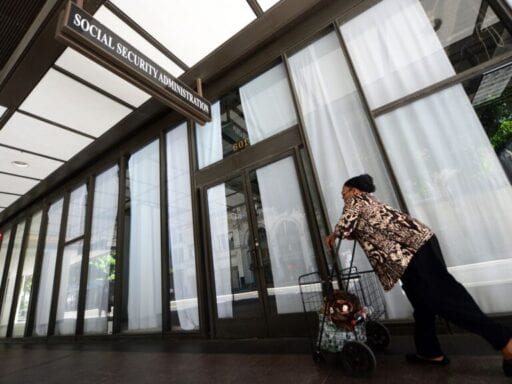Despite the Covid-19 pandemic, disability hearings remained open until March 17. Immigration courts have continued proceedings.
Update March 16 6:40 pm: The Social Security Administration announced it will be closing its doors for in-person services, including hearings, effective March 17. Many immigration courts, meanwhile, are expected to remain open.
While courts around the country and shutting down because of Covid-19 fears, the Social Security Administration is still requiring in-person disability hearings — which poses a high risk to large number of seniors seeking aid.
HuffPost reporter Jennifer Bendery first tweeted a release from the Association of Administrative Law Judges on Monday morning. Leaders of AALJ, which represents 1,300 judges who oversee disability hearings, criticized the SSA for continuing in-person proceedings, especially when many immunocompromised senior citizens frequent the courtrooms. To protect its claimants from the virus, the group asked for the government to cancel hearings for a limited time.
“We care deeply about our claimants and about hearing their cases,” AALJ president Judge Melissa McIntosh told Vox. “So we didn’t ask for [the cancellations] lightly or without much care, concern, and deliberation. We sincerely believe we need to postpone the hearings for two and a half to four weeks in order to protect the American public.”
So… the Social Security Admin is still requiring people to do in-person disability hearings all over the country. Many of these people are senior citizens + report compromised immunity.
Maybe it’s time to, uh, pause this ASAP, @SocialSecurity? pic.twitter.com/WuOsE14eiE
— Jennifer Bendery (@jbendery) March 16, 2020
Disability hearings are held to determine whether one’s condition is too disabling to continue work. After a series of questions about medical treatment and employment history, a judge will determine whether the claimant is eligible for benefits such as Social Security Disability Insurance.
The hearings are usually held in small conference rooms with close contact between the lawyers, judges, and claimants. This environment provides a particularly dangerous setting for older claimants, who are statistically more likely to die from Covid-19. Although there’s little data on the people who pass through disability hearings, the largest percentage of disabled worker beneficiaries of SSDI in 2018 were between the ages of 60 and 64.
Yet McIntosh said the government has failed to respond to AALJ’s concern for its senior claimants. In February, she said her organization tried to get ahead of the crisis by proposing phone hearings for those who exhibited Covid-19 symptoms. SSA, however, has only allowed limited telework, leaving claimants vulnerable to Covid-19 risks, she said. And while these tele-hearings would be ideal in keeping cases rolling, they’re still not the best measure for safety because they require the staff, judges, and a hearing reporter to be in the office — which is why AALJ is advocating for a complete shutdown.
“They wouldn’t take any of our suggestions,” McIntosh said. “So now we’re just a critical mess. It’s just entirely irresponsible without all of those safeguards being put into place. It’s just irresponsible to proceed with hearings. We really need to hit pause.”
The few courts that are still open handle the most vulnerable populations
It’s not just disability hearings that are left open. Immigration courts are also continuing proceedings, which has outraged prosecutors, judges, and lawyers alike. Although the three groups — prosecutors from the US Immigration and Customs Enforcement, the National Association of Immigration Judges, and the American Immigration Lawyers Association — may seem like unlikely allies, they’ve joined forces to ask for a shutdown of immigration courts across the country.
“Our nation is currently in the throes of a historic global pandemic,” they wrote in a joint statement on Sunday. “The Department of Justice’s (DOJ) current response to the COVID-19 pandemic and its spread is insufficient and not premised on transparent scientific information. The DOJ is failing to meet its obligations to ensure a safe and healthy environment within our Immigration Courts.”
As of now, an immigration court has been shut down in Seattle, while some hearings have been canceled in a handful of states, including Miami, San Francisco, Los Angeles, and New York City, according to BuzzFeed. That’s not enough, however, to mitigate the dangers of Covid-19, especially for children going through the immigration court system, said Jennifer Nagda, policy director at the Young Center for Immigrant Children’s Rights.
“The best available guidance today is that people should not be gathering in groups of more than 10,” Nagda said. “That can’t be done for children who are in custody who are coming into the courts from facilities, and there is no reason that the children should be subjected to a situation that is less safe than what the government is requiring for all people.”
The continued openings of both disability hearings and immigration courts point to a disturbing trend in our judiciary system in the midst of Covid-19: The most vulnerable groups are being forced to put themselves in high-risk situations for proceedings they dare not miss.
In disability hearings, those seeking benefits are often senior citizens with compromised immune systems. Many also likely face financial difficulties because of a disability that limits their employment opportunities. Likewise, many of the immigrants that travel to court are low-income with limited access to health care. A large portion use public transportation for their court cases, which in many cases have been dragging on for months. Neither of these groups has the luxury to skip their proceedings — even if they may not be emergencies — out of fear of getting Covid-19, yet the government isn’t doing much to protect them either.
Author: Catherine Kim
Read More



